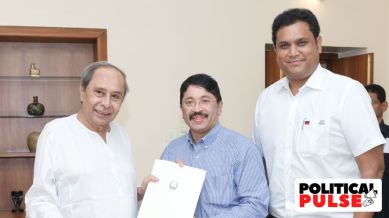BJD makes common cause with Opposition: To join delimitation meeting, questions poll data
Naveen Patnaik on Tuesday agreed to attend the meeting on delimitation convened by M K Stalin, while a BJD delegation petitioned the EC about alleged discrepancies in votes cast in Lok Sabha and Assembly polls last year.

In the clearest sign yet of how much the Biju Janata Dal’s (BJD) political position has shifted since it lost power to the BJP in last year’s elections, party president and former Chief Minister Naveen Patnaik has accepted Tamil Nadu CM M K Stalin’s invitation to attend a meeting on setting up a joint action committee on delimitation.
A two-member DMK delegation of former Union Minister Dayanidhi Maran and Tamil Nadu Industries Minister T R B Rajaa met Patnaik at his residence here, Naveen Niwas, on Tuesday to discuss the issue.
monthly limit of free stories.
with an Express account.
“The DMK leaders conveyed the message of their party chief about the concern and anxiety on the issue of the delimitation exercise. They also invited the BJD president to the meeting in Chennai on March 22. Several states, including Odisha, will possibly be affected in the delimitation exercise,” said BJD vice president Debi Prasad Mishra. The BJD leader said Patnaik had agreed to participate in the meeting and said that he shares the concerns of the southern states. BJD sources said the party will protest if the number of Lok Sabha seats allocated to Odisha, 21, is reduced.
This is not the first time that Patnaik has aligned with the southern states. In 2018, the then CM joined the southern states in opposing the mandate of the 15th Finance Commission, saying it favoured northern states with a higher rate of population growth. In a letter to Prime Minister Narendra Modi, Patnaik at the time demanded that the Commission use the population data of the 1971 Census, instead of the 2011 Census, to make its proposals on horizontal devolution.
The BJD’s latest decision to join the meeting is significant as the party recently joined other Opposition parties to demand a debate in Parliament on the issue of “duplication of voter ID cards”. The BJD’s leader in the Rajya Sabha, Sasmit Patra, said the Election Commission (EC) had already acknowledged there was a serious problem on duplication of voter ID cards and it requires a discussion.
The party has also raised questions about alleged discrepancies in votes cast in the Lok Sabha and the Assembly elections last year. On Tuesday, a delegation of party leaders submitted a follow-up memorandum to the EC. In December, the BJD had flagged three major concerns that it claimed were backed by around 200 pages of “solid data”. The concerns were the alleged difference in the total votes polled at the booth level and the total votes counted from corresponding EVMs; the alleged difference in the votes cast for the Lok Sabha and Assembly elections despite the polls being held simultaneously; and the “huge difference” in the voter turnout numbers released by the EC on polling day and the final figures declared two days later.
Some of the Opposition parties in the INDIA bloc, including the Congress, have also expressed concerns about alleged discrepancies in voter turnout data and alleged irregularities in electoral rolls.
Slowly out of BJP’s orbit
Though the BJD broke ties with the BJD ahead of the Lok Sabha elections in 2009, the two parties remained on amiable terms through the subsequent years. For the Narendra Modi-led BJP, the Patnaik-led party was one of the parties outside the NDA fold that it could trust to support its legislative agenda in Parliament.
Even as the INDIA bloc took shape in the run-up to the Lok Sabha polls, the BJD kept its distance from the anti-BJP Opposition grouping. However, in Odisha, the BJP ended Patnaik’s 24-year run in power in the state and after losing power, the BJD slowly changed its position on not taking on the ruling party in the Centre.
First, the BJD announced it would stop lending “issue-based support” to the BJP so that it could be a “strong and vibrant” Opposition in Parliament. Last June, it joined the Opposition in demanding a discussion on alleged paper leaks and irregularities in examinations such as NEET and NET.
Though two of the BJD’s Rajya Sabha MPs, Mamata Mohanta and Sujeet Kumar, switched sides to the BJP last year and got re-elected, the party continued to oppose the Modi government and has opposed the Waqt Amendment Bill.